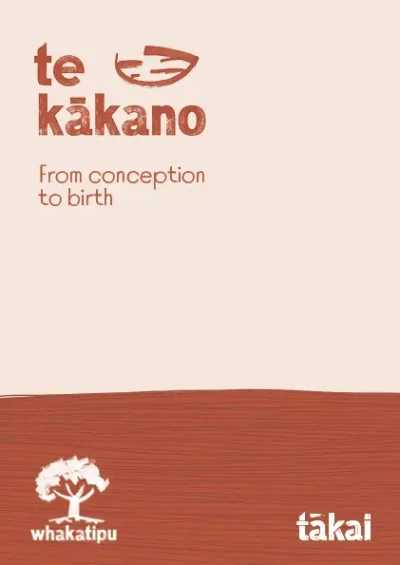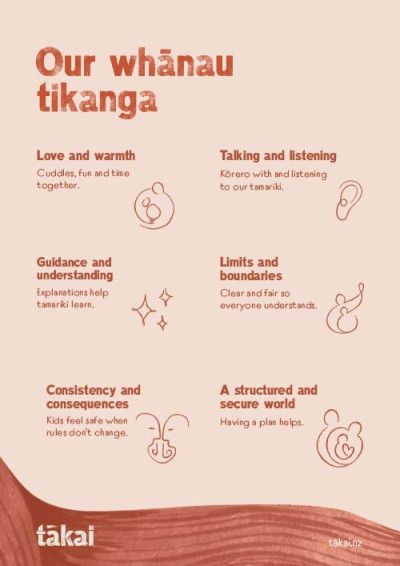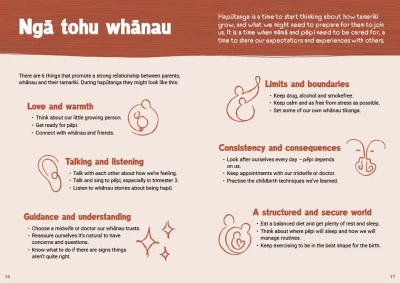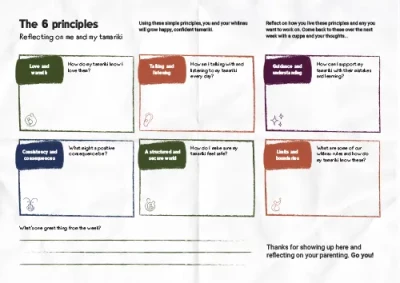
Six things babies need – effective discipline
Pregnancy is a good time to start thinking about how to help kids grow into happy adults. The 6 principles for effective discipline are helpful on this journey. These principles can be applied to all ages and provide the foundation for Tākai resources.
Relationships and communication
Most people want to be happy and capable, and want their children to grow up to be happy and capable too. Right from the start, early relationships and good communication make all the difference. This is where the 6 things children need to grow into happy, capable adults helps. They’re also known as:
- the 6 principles of effective discipline
- ngā tohu whānau.
The 6 things:
- are based on research from a 2004 report by the University of Otago and the Office of the Children’s Commissioner
- provide the foundation principles underlying all Tākai resources
- can be applied to all ages and situations
- are well worth becoming familiar with.
The six things
The 6 things
Each statement below describes the basic and most important ideas about each principle.
Principle 1: Love and warmth
This is required from the very beginning of life, as it helps build the bonds of trust and love, and positive self-esteem. It’s also a way for parents to invest in their relationship, and makes respectful discipline easier and more effective.
Principle 2: Talking and listening
Talking with children, listening to what they say, and giving clear messages suitable to their age creates good outcomes. Expectations cannot be lectured into or shouted at children. Their fear, and the need to defend themselves, will overpower their ability (and willingness) to listen.
Principle 3: Guidance and understanding
Children are more likely to cooperate when they understand why we require things from them. Straightforward respectful explanations inspire greater cooperation than methods such as guilt trips.
Principle 4: Limits and boundaries
Rules keep things fair and safe for everyone in the family. Rules need to teach mostly ‘what we do’ rather than ‘what we don’t do’. For families who need more support, the clearer the rules are for their children, the more successful the outcomes. But remember, rules need to work for everyone — not just the parents.
Principle 5: Consistency and consequences
Consistency involves predictability. Children connect an action with a consequence from an early age. When consequences are applied there is real learning — without suffering. Relationships can also stay intact. The 3 Rs of creating consequences successfully are to make consequences Related, Reasonable, Respectful. Parents need to apply all three if they are to experience success and satisfaction. This method teaches children to put things right.
Principle 6: A structured and secure world
This involves two things:
- Planning ahead to avoid predictable difficulties by, for instance, putting breakable objects out of reach of two-year-olds.
- Monitoring your own behaviour — children will copy your behaviour. This is called modelling, and is a major learning tool.
Whakatipu booklet Te Kākano – ngā tohu whānau (pages 16 and 17) shows how each of the above principles can be understood for pregnancy and prenatal babies.
These statements help us understand how the 6 principles are relevant during pregnancy. The important messages about taking care of the pregnant parent and thinking about the needs of the baby throughout Te Kākano are all reinforced in ngā tohu whānau.
Try an activity
Write to your baby
Thinking about your baby as a person helps you start building a positive relationship with them even before they’re born.
 pdf 12 MB
pdf 12 MB














